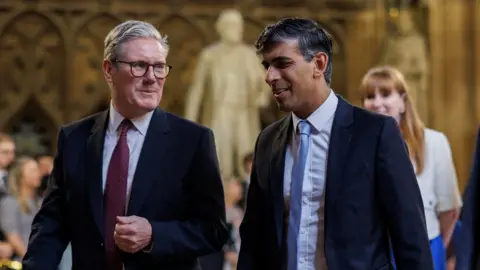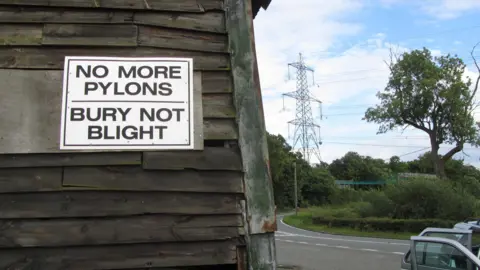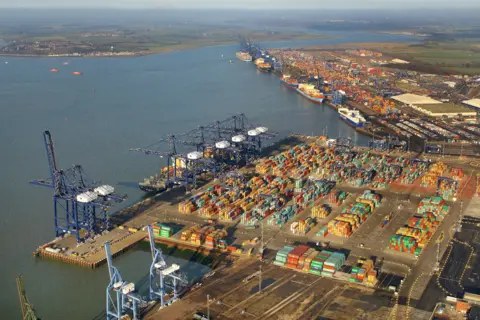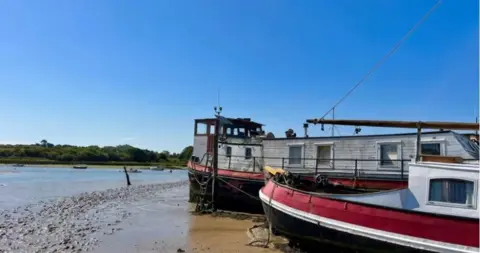What the King's Speech means for the East of England
 Dan Kitwood/PA Media
Dan Kitwood/PA MediaThe King's Speech outlines the new laws which the government intends to introduce over the next year.
A lot of them focus on the economy, health, and law and order and will affect us all.
But there are also going to be new laws on building, energy, transport and water quality which will have a big impact on the East of England.
These are only proposals at the moment. Parliament has yet to debate and vote on them before they become law.
The Planning and Infrastucture Bill

This will have an impact across the region where there is a growing need for new homes and an urgent demand to produce more energy.
The new bill talks about changing the planning system to unlock more housing and infrastructure as well as accelerating upgrades to the national electricity grid.
The accompanying note talks about "modernising planning committees", "streamlining the delivery process" and "improving [council] performance and decision making".
But the government also says that its commitment to the environment will be unwavering.
Ministers have already made it clear that building homes and boosting renewable energy are key objectives.
But across the region there are contentious plans for new housing estates, electricity substations and pylons.
National Grid wants to put up a 114 mile-long (184km) power line across Essex, Suffolk and Norfolk to carry electricity from offshore wind farms.
Plans for a 2,500-acre solar farm spanning the Cambridgeshire-Suffolk border have also been approved in recent days.
This bill will be welcomed by some, but it will also worry many rural communities worried about over-development.
The Passenger Railway Services and Railways bills
 Port of Felixstowe
Port of FelixstoweThese two bills will take all train companies back into public ownership. Ministers says this will provide better value for money for passengers and tax payers.
All rail companies in the region currently have franchise contracts which are due for renewal over the next few years. Abellio's Greater Anglia contract officially ends in September this year, although there is a clause to extend it for another two years.
The government says it intends to bring all contracts back into public ownership as soon as possible once the new law has been passed.
There will also be simpler ticketing for passengers and targets to carry more freight by rail - which will have a big impact at the container ports at Felixstowe and on the Thames estuary in Essex.
Water (special measures) Bill
 Martin Giles/BBC
Martin Giles/BBCThe quality of river and sea water was a big issue in the general election. This bill puts pressure on the water companies to do more to deal with the problem.
The water regulator Ofwat will have the power to ban the payment of bonuses to water bosses if environmental standards are not met. It will also be able to impose more severe fines.
The water companies will be made to install real-time monitors at every sewage outlet and the data will be independently scrutinised.
The government says it will not tolerate poor performance across the water sector but it warns that "change will take time".
English Devolution Bill
 Stefan Rousseau/PA Media
Stefan Rousseau/PA MediaThis aims to give more powers to locally elected representatives, led by a directly elected council leader or mayor.
The government believes that local leaders better understand the needs of their area and can get things done more quickly that Whitehall.
At the moment Cambridgeshire & Peterborough and Bedford both have directly elected mayors.
Norfolk and Suffolk plan to bring in a form of devolution next year, Essex and Buckinghamshire are also in the early stages of considering the idea.
This new bill wants to make devolution "the default setting" and "put a more ambitious and standardised devolution framework into legislation" .
This could affect some of the plans in the pipelines, but it will mean that in the future locally elected politicians rather than Whitehall officials will have more of a say over things like building, transport and skills training.
Politics East is broadcast on Sunday mornings on BBC One and is available on the BBC iPlayer.
Got a story? Email [email protected], external or WhatsApp us on 0800 169 1830
